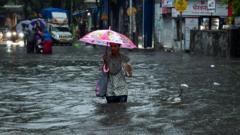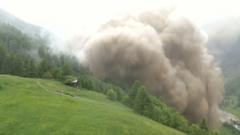The successful rescue of ten endangered flamingos near Tunisia's Algerian border highlights ongoing conservation efforts against wildlife smuggling amid environmental threats facing these migratory birds.
Flamingos Rescued from Smugglers in Tunisia

Flamingos Rescued from Smugglers in Tunisia
Ten endangered flamingos have been saved by Tunisian customs officials who intercepted smugglers attempting to traffic the birds.
Ten endangered flamingos have been rescued after smugglers were apprehended while attempting to illegally transport them out of Tunisia, as reported by the country's customs authority. The rescue occurred close to the Algerian border on Sunday, where customs officials discovered the birds cramped in crates, with their wings, legs, and bodies bound. Accompanying images depicting the dire conditions of the flamingos were shared online, illustrating the grave situation they were in.
According to the customs authority, the flamingos were being shipped on a lorry that had a Tunisian registration plate. Following their rescue, the birds were returned to their natural habitat, consistent with ongoing initiatives to protect the species.
While illegal hunting and smuggling of flamingos is prohibited under Tunisian law, the article does not specify the potential penalties for the suspected traffickers. In addition to human trafficking threats, flamingos face challenges from pollution and climate change, which are shrinking their wetland habitats.
The greater flamingo (Phoenicopterus roseus) is classified as a threatened species by the International Union for Conservation of Nature. However, there is a silver lining; recent data suggests that, over the last decade, the wild population has seen an uptick, with estimates now indicating that over half a million flamingos exist in the wild.
North Africa remains a significant point in the migration journey of these birds, as they can also be seen across Europe, West Africa, and Asia. Key locations for birdwatching include Djerba Island in southeastern Tunisia and the Korba Lagoon to the north.





















